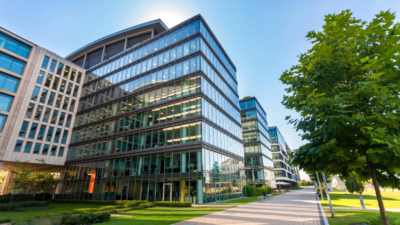In this three-part series, we explore how law firms can leverage a lease event — whether a lease expiration, relocation or renewal — as a catalyst for transformational change in their workplace environment. First, we’ll examine the changing environment and disruptors to the industry, then workplace trends the most progressive law firms embrace and finally, conclude with best practices for law firms to strategically leverage the workplace to align with their vision.
The rapidly changing legal landscape means law firms need to adapt to stay viable in the coming years. With the rise of other providers of legal services, including the Big Four accounting firms and a growing number of alternative legal service providers, the legal industry is swiftly moving into a transition period. A plurality of legal teams consider “doing more with less” to be their biggest challenge in the coming years, according to Deloitte. Honing a niche, becoming more efficient, integrating disruptive technologies and integrating future-thinking design will all become necessary steps to survive — and thrive — through this period of evolution.
There are three primary ways the legal industry is transforming:
Technology is the greatest disruptor. Tech innovations are changing the legal practice in multiple ways, from the digitization of paper documents and the new ways lawyers communicate with clients and staff to the increasing viability of AI and digital assistants. Thomson Reuters reports, “Many larger law firms now have dedicated legal technology development teams that combine legal, project management, data analytics and IT skills.” Electronic discovery is the new standard, producing reams of highly complex data, which in turn has created new jobs for managing that data.
Technology is also democratizing law, making it more accessible and user-friendly, empowering the client. New virtual technologies and services mean lawyers no longer have a monopoly on legal services. Further, it is now easier for potential clients to price-shop for legal assistance. However, with the rise of electronic data comes the threat of data breaches, which pose an existential threat to the legal profession and necessitate higher spending on data security.
Talent needs are shifting. Tech solutions alone can produce big staffing changes and space requirements As firms integrate technology, tech workers will become increasingly necessary to manage complex data systems, and firms will need to find ways to attract this high-demand tech talent. Strategies like the continual reduction of assistants and the adoption of legal process outsourcing (LPO) offers other alternatives. Additionally, the decreasing return on the cost of a law degree means firms have to fight harder to attract talent to the profession and retain talent, particularly diverse, younger millennial and Gen Z attorneys.
To attract talent, some firms are offering higher levels of flexibility to support a better work-life blend, including flexible schedules, work-from-home programs and co-working solutions near courthouses to reduce commutes. Creating a workplace that “feels good” can be a magnet for talent, especially combined with a holistic wellness program which offers healthy food options, fitness centers with classes and ergonomically designed settings. Larger firms may build these features into their space, but many are leveraging building amenities to accomplish these goals.
Within the workplace, creating more informal spaces for impromptu mentoring and collaboration are a plus, as well as open space which allows people to find each other and spark connections, reflecting a welcoming culture. For job-searching millennials, culture trumps all — they want a culture in which they can thrive. While culture can be slow to change, the workplace provides one of the largest billboards for a firm. When a candidate, employee or client walks in the door, the workplace communicates “who you are” and is an opportunity to curate intentional experiences and messaging.
Client expectations have evolved. Gensler notes, “Law firms are now part of a value-based economy.” Clients demand lower fees and faster turnaround times. They expect legal suppliers to be tech-savvy and offer digital interaction. Legal consumers are more sophisticated, and legal services have become a buyers’ market. To maintain viability in an increasingly competitive market, firms must value space and time efficiency while also exploring new billing models and staffing methods. No longer are opulent offices expected or even desired. Instead, clients expect offices that seamlessly support a digital experience, including virtual meetings and ubiquitous technologies. These services are expected to compete with the variety of legal services offered by non-traditional vendors, including automated legal services. Firms must continue to find ways to meet the increasing demand for specialized issues and litigation, instead of generalized law services, which are increasingly being managed by organizations’ internal law departments, assisted by automation.
When planning for a changing future, law firms need a strong workplace strategy which integrates new work processes, the changing workforce, technology and opportunities for brand and culture evolution. A workplace strategy ensures that firms are leveraging their workplace as a strategic asset today and throughout the term of their lease.
Next, in this series, we’ll discuss the best practices progressive law firms are embracing and the opportunities created with a lease event.

 Colliers Insights Team
Colliers Insights Team

 Marc Shandler
Marc Shandler Josh Cramer
Josh Cramer
 Jesse Tollison
Jesse Tollison
 Katie Watts
Katie Watts